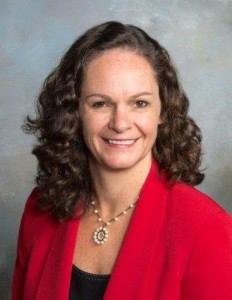
Vice President of Student Affairs Juliette Landphair
Vice President of Student Affairs Juliette Landphair, who is the Farmer Legacy 2020 co-chair, penned a column in The Richmond Times-Dispatch on the late Rep. John Lewis’ legacy and the impact that he and Dr. James L. Farmer Jr. have had on the University of Mary Washington and its students.
Sixty years ago, much like today, many American young adults were on fire to dismantle racial discrimination. U.S. Rep. John Lewis, D-Ga., who recently passed away as an international icon for civil rights and public service, was one of them. Born in 1940 into a tenant farming family in Pike County, Ala., where half of their cotton crop’s earnings went to the white landowner, Lewis grew up in a poor, rural part of the nation completely alien from stereotypical recollections of 1950s consumerism and suburbanization. As historian Dr. Andrew Lewis recalls, John Lewis’ childhood “conjures up a world that the twentieth century seemed to have passed by.”
While in college at American Baptist Theological Seminary in Nashville, Tenn., Lewis became active in civil rights protest. Over a few critical months in late 1959 and early 1960, he and other young activists, including the extraordinary (and not enough remembered) Diane Nash, attended workshops on nonviolence and its philosophical roots, taught by the minister James Lawson. Principles such as the power of the collective and the redemptive community settled into Lewis’ conscience and remained the rest of his life; he later described “crossing over” into a lifelong commitment to the movement in 1960 while participating in the Nashville sit-ins.
At my institution, the University of Mary Washington (UMW), Lewis figures prominently in our story. We like to think it is a special bond, but of course, Lewis made all admirers feel important. In 1961, Dr. James Farmer, leader of the Congress of Racial Equality (CORE), who later became a Mary Washington College professor, helped recruit the 21-year-old Lewis to join 12 others on the Freedom Rides. They would travel on two buses through several Southern states challenging interstate transportation facilities. During the Rides, Lewis was attacked by angry whites in South Carolina and Alabama.
More recently, Lewis agreed to serve as honorary chair of Farmer Legacy 2020, UMW’s yearlong celebration of the 100th anniversary of his friend Dr. Farmer’s birth. This past November, in his official acceptance of his chairperson role, Lewis met with a small UMW delegation in his Capitol Hill office for nearly an hour. I was fortunate to be among the attendees. With his celebrated warmth and humility, he spent nearly an hour with us, asking about UMW and our lives, and sharing stories. He especially was attentive to Jason Ford, our Student Government Association president who, as a black man himself, knew he was in the presence of a giant on whose shoulders he stood. Read more.